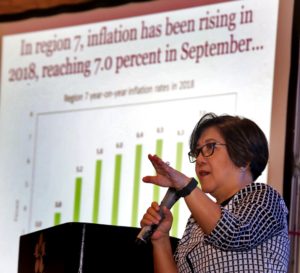Gov’t measure to curb inflation: SRP on pork, chicken, and rice

Regional Director Asteria C. Caberte of the Department of Trade and Industry-Central Visayas (DTI-7), discusses the price situation amid the rising inflation during Friday’s DTI forum in Parklane International Hotel.
CDN PHOTO/JUNJIE MENDOZA
The Department of Trade and Industry in Central Visayas (DTI-7) is assuring the public that the government is putting in place measures to arrest the continued increase in prices of basic commodities.
Among these measures is to impose a suggested retail price (SRP) on agricultural products like chicken, pork, and rice.
“These are very drastic measures. Imposing a price ceiling on agricultural products, karon pa na (this is the first time). In economics, we should not put a price ceiling on highly perishable goods,” said DTI-7 Regional Director Asteria Caberte during the Consumers Forum at the Cebu Parklane Hotel last Friday.
To recall, the DTI, Department of Agriculture (DA), and the National Food Authority Council (NFAC) agreed earlier this month to impose the SRPs on these three products.
For one, it was agreed that for chicken, retailers can only add up to P50 profit margin on top of the farm gate prices. For pork, it is up to P70 as profit margin.
Inflation rose to 6.7 percent in September. For Central Visayas, Caberte said it was higher at 7 percent.
In her talk, Caberte explained that based on government data from the September 2018 inflation, the top contributors are rice, fish, vegetables, and meat; taking up 2.8 percentage points of the total 6.7 percent.
This is why government efforts are directed towards addressing these agricultural raw products.
The government is also pushing for rice tariffication wherein the quantitative restrictions in importing rice will be lifted to encourage more importers to help bring down prices of rice.
An SRP on rice is also being planned by the government, Caberte added.
Other commodities
Meanwhile, the DTI-7 has noted only minimal increases in the prices of prime commodities and basic necessities based on their monitoring.
The DTI monitors a total of 203 shelf keeping units (SKUs) or product variants all over the country. In Central Visayas, there are 182 SKUs.
These items include among others, cans of sardines, milk, coffee, and other basic products.
“Out of these 182 products in Central Visayas, only seven products have increased their prices. The increases range between 4 percent to 10 percent. Very minimal. For those products that are monitored by DTI, there is only little impact,” Caberte said.
She explained that the DTI is only mandated to monitor the prices of basic necessities and prime commodities.
Agricultural products, which are the main drivers of inflation, are monitored by the DA and NFAC, among others.
At the same time, Caberte assured that the government and manufacturers have agreed to hold off any additional price increases in the next three months up to the end of 2018. This agreement started last August.
She pointed out that among the reasons why some manufacturers increased prices before is the higher cost of other materials like the cans used for sardines which have to be imported from abroad.
The weakening peso value also added to this as manufacturers needed to spend more pesos to buy these materials.
Caberte explained that the main causes of inflation in the country are the insufficient rice supply in the market, higher prices of oil in the global market, weakening of the peso, and the Tax Reform for Acceleration and Inclusion (Train) law, which she said had only “minimal” contribution.
At the same time, she said the fact that most Filipinos now have a higher take home pay, has also contributed to inflation.
Programs like the unconditional cash transfer also contributes as the government is making available more money without a corresponding increase in productivity.
“We are giving P32.5 billion per month as additional income to people. Around 90 percent of that is spent and that is inflationary. There is additional supply of money in the economy with no corresponding increase in productivity,” she said.
Disclaimer: The comments uploaded on this site do not necessarily represent or reflect the views of management and owner of Cebudailynews. We reserve the right to exclude comments that we deem to be inconsistent with our editorial standards.
